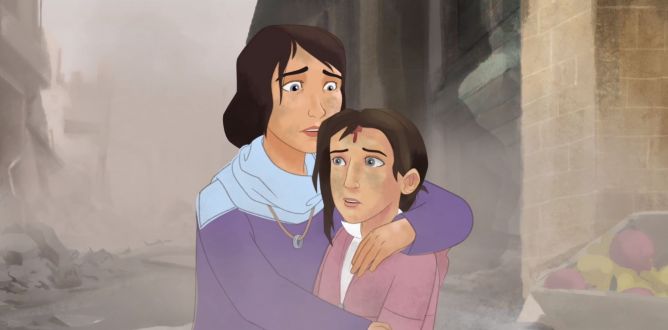Lamya’s Poem Parent Guide
Clumsy animation and poor pacing bog down a story that should be enchanting but isn't.
Parent Movie Review
The Syrian civil war rages but 12-year-old Lamya (Millie Davis) and her widowed mother (Aya Bryn Zakarya) live quietly in the city of Aleppo. Lamya plays with her friends, texts on her phone, and enjoys regular visits from Professor Hamadani, an elderly teacher who tries to provide education for as many children as possible. Lamya is one of his star pupils and he gives her a treasured book by Rumi, a famous 13th century poet. She is intrigued by the poems, so when a bomb levels their neighborhood, his book is one of the treasured possessions that goes with her on a perilous journey to Europe.
Born Jalal al-Din (Mena Massoud), the poet now referred to as Rumi knew what it was to be a refugee. In 1220, the city of Samarkand was attacked by the Mongols, forcing his family to flee across central Asia. Jalal al-Din struggles with rage against the invaders and a desire to fight back – with the sword; not the pen alone. His father reminds him that he was born a writer for a reason: “Someone, somewhere needs your words. If not today, then tomorrow. If not here, then perhaps in a place you can hardly imagine.” The words are prophetic because Rumi will become Lamya’s guide through her own perilous journey.
Lamya isn’t only aided by Rumi’s published poems. The two young people repeatedly meet in a dreamscape where they talk to one another, revel in idealized landscapes, and battle monsters. To some extent the dreamscape represents their real-world experiences of war and peril but it also explores their inner worlds of anger, fear, pain and hatred. (It should be noted that all of these locations feature some violent and disturbing scenes, making this movie unsuited for kids. The film doesn’t have an MPA rating, but it should be rated PG-13.)
Few films have caused me as much frustration as Lamya’s Poem. The plot is intriguing, weaving together refugee experiences across the centuries. The script also delivers excellent messages about loss, love, forgiveness, kindness, and emotional resilience. And, of course, exposing audiences to the words of the great poet is a plus and will hopefully encourage people to seek out more of Rumi’s poems.
Sadly, Lamya’s Poem doesn’t live up to its source material. The animation is painfully bad, with jerky movements and flat, uninspired renderings. This is a story that deserves magical animation that will enchant us and draw us into the emotional heart of the story. Instead, we get humdrum, unconvincing work that, weirdly enough, is only convincing in night-time scenes. I’m also going to raise my pet peeve, which is the design of the dreamscape. For some reason, the city has a steampunk aesthetic, complete with airships. With an entire world of glorious Muslim art to choose from, why on earth would the film’s visual designers go with a steampunk look? I like the style, but it doesn’t belong here.
As if the backgrounds weren’t annoying enough, the movie also suffers from pacing issues. It bounces back and forth between the modern world, the 13th century, and the dreamscape - often randomly. It’s both odd and disappointing that a film about a man’s magical words should be so pedestrian and dull.
Directed by Alexander Kronemer. Starring Mena Massoud, Faran Tahir, Millie Davis. Running time: 89 minutes. Theatrical release February 21, 2023. Updated January 22, 2024Watch the trailer for Lamya’s Poem
Lamya’s Poem
Rating & Content Info
Why is Lamya’s Poem rated Not Rated? Lamya’s Poem is rated Not Rated by the MPAA
Violence: In the contemporary world, men are seen carrying firearms. Bombs fall and buildings are shown destroyed and people have bloody wounds. A raft capsizes in stormy seas and people are lost. Tear gas is thrown in a refugee camp and riot police intimidate people. In the 13th century, a city is attacked by mounted men and the city is shown in flames. A man uses a slingshot to kill birds. A young man considers killing someone. In a dreamscape, a child imagines an amorphous creature with large red eyes. Red-eyed, wolf-like creatures ride monstrous red-eyed horses. Enchanted destructive vines destroy a city and later rip apart an airship, which bursts into flames as people fall to their deaths. The vines encircle a girl and fill her with hatred and evil. Flaming projectiles are launched at a city. A giant snake attacks people and we are told that they all die.
Sexual Content: None
Profanity: None
Alcohol / Drug Use: None
Page last updated January 22, 2024
Lamya’s Poem Parents' Guide
Have you ever been inspired by the words of a book? Has it helped you see things in a new light or has it strengthened you against difficult experiences.?
You can learn more about Rumi below:
Wikipedia: Rumi
Poets.org: Jalal al-Din Rumi
For information about the Syrian Civil War and the refugee crisis, you can check these links:
Encyclopedia Britannica: Syrian Civil War
Council on Foreign Relations: Syria’s Civil War: The Descent into Horror
BBC: Why Has the Syrian Civil War Lasted 11 Years?
Wikipedia: Refugees of the Syrian Civil War
Loved this movie? Try these books…
If you want to read more of Rumi’s poems, you can try the links below:
Rumi.org: Rumi’s poetry
Best Poems: Mewlana Jalaluddin Rumi
Home Video
Related home video titles:
A more compelling story of Syrian refugees is told in The Swimmers. This movie shares the story of two sisters, both elite swimmers, who undertake the dangerous trek to find asylum in Germany. Syrian refugees find safety in Canada in the fictional story Jasmine Road, and the real world Peace by Chocolate.
An Afghan refugee’s perilous experiences are recounted in Flee, which also uses animation to tell its story.

